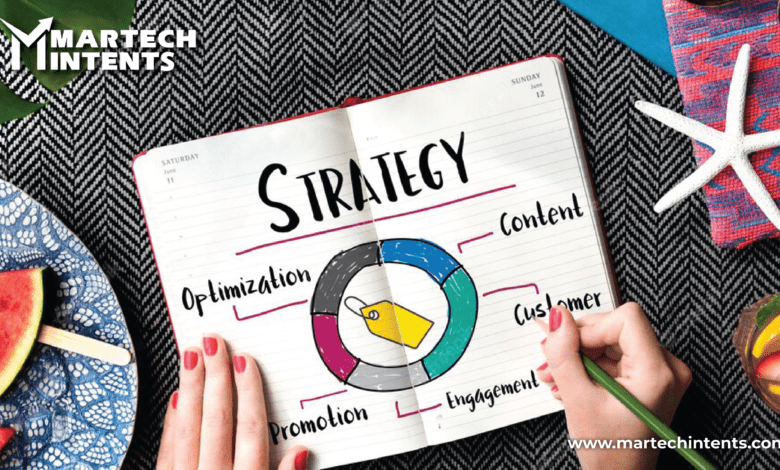MarTech Unleashed: Revolutionizing Marketing Strategies!

Introduction:
In today’s digital landscape, marketing technology (MarTech) has become a game-changer for businesses seeking to enhance their marketing strategies. With an array of innovative tools and solutions at their disposal, marketers can now drive targeted campaigns, automate processes, and gain valuable insights to stay ahead in the competitive market. This article delves into the transformative impact of MarTech and provides real-world examples of where it is reshaping the marketing landscape.
I. The Rise of MarTech: Shaping the Future of Marketing
Understanding MarTech: Defining the Scope
MarTech encompasses various technologies and tools that enable marketers to optimize their marketing efforts. From email marketing and content management systems to customer relationship management (CRM) software and data analytics platforms, MarTech covers a broad range of solutions.
The Growing Importance of MarTech in Business Success
One notable example of MarTech’s impact is the success story of Company ABC, a global software company. They implemented marketing automation software that streamlined their lead generation and nurturing processes. By automating repetitive tasks, they freed up valuable time for their marketing team to focus on strategic initiatives. This resulted in increased efficiency, improved lead conversion rates, and ultimately, a significant boost in revenue.
Key Benefits of MarTech Adoption
MarTech adoption offers several benefits for businesses. For instance, Company XYZ, an e-commerce retailer, utilized MarTech tools to personalize its marketing campaigns. By analyzing customer data and behavior, they created tailored product recommendations and personalized email marketing campaigns. As a result, their conversion rates improved by 15%, and customer satisfaction and loyalty increased.
II. Empowering Marketing Campaigns with MarTech Solutions
Data-Driven Decision Making: Harnessing the Power of Analytics
Analytics tools, such as Google Analytics and Adobe Analytics, enable marketers to gain valuable insights into customer behavior, campaign performance, and ROI. For example, Company DEF, a fashion brand, utilized analytics to track the success of its influencer marketing campaigns. By monitoring engagement metrics and conversion rates, they identified high-performing influencers and optimized their partnerships, resulting in a 30% increase in online sales.
Personalization at Scale: Tailoring Experiences for Target Audiences
MarTech solutions, like marketing automation platforms and customer data platforms (CDPs), allow businesses to create personalized experiences at scale. Company GHI, a travel agency, implemented a CDP to collect and unify customer data from multiple touchpoints. By leveraging this data, they created highly targeted email campaigns and personalized website experiences, resulting in a 25% increase in booking conversions.
Streamlining Automation: Enhancing Efficiency and Productivity
Marketing automation tools, such as HubSpot and Marketo, enable marketers to automate repetitive tasks, such as email workflows and social media scheduling. Company JKL, a B2B software provider, implemented marketing automation to nurture leads throughout their sales funnel. By delivering relevant content at each stage, they achieved a 50% reduction in lead conversion time and a 20% increase in qualified leads.
III. Enhancing Customer Engagement and Experience
Omni-Channel Marketing: Delivering Consistent Experiences
MarTech facilitates omnichannel marketing, enabling businesses to deliver consistent messaging and experiences across various channels. Company MNO, a retail brand, implemented an integrated MarTech stack to unify its customer touchpoints, including its website, social media, and physical stores. By providing a seamless shopping experience, they achieved a 40% increase in repeat purchases and customer satisfaction.
Social Media and Influencer Marketing: Amplifying Brand Reach
MarTech tools, such as social media management platforms and influencer marketing platforms, empower marketers to expand their brand reach and engage with their target audience. For example, Company PQR, a beauty brand, utilized social listening tools to identify relevant influencers in their niche. By collaborating with these influencers, they significantly increased brand awareness, resulting in a 60% rise in social media followers and a 25% increase in online sales.
Customer Journey Mapping: Understanding and Optimizing Interactions
MarTech solutions, including customer journey mapping software, enable businesses to gain insights into customer touchpoints and optimize interactions. Company STU, a telecommunications provider, utilized customer journey mapping to identify pain points in their onboarding process. By streamlining the customer experience, they reduced customer churn by 15% and improved customer satisfaction scores.
IV. MarTech and Sales Alignment: Driving Revenue Growth
Marketing Automation and CRM Integration: Bridging the Gap
Integrating marketing automation tools with CRM systems allows businesses to align marketing and sales efforts seamlessly. Company VWX, a B2B technology company, implemented marketing automation and CRM integration to track lead interactions and prioritize sales efforts. This resulted in a 20% increase in lead-to-customer conversion rates and improved sales team efficiency.
Lead Generation and Nurturing: Optimizing the Sales Funnel
MarTech facilitates effective lead generation and nurturing strategies, enabling businesses to optimize their sales funnel. Company YZ, a software-as-a-service (SaaS) provider, utilized lead scoring and nurturing workflows to qualify leads and guide them through the sales process. As a result, they experienced a 30% increase in lead-to-opportunity conversion rates and shortened sales cycles.
Sales Enablement: Empowering Sales Teams with Insights
MarTech tools, such as sales enablement platforms and content management systems, equip sales teams with the necessary insights and collateral to engage prospects effectively. Company 123, a manufacturing company, implemented a sales enablement platform to provide their sales team with easy access to product information and relevant content. This led to a 25% increase in sales productivity and a 10% growth in revenue.
V. Overcoming Challenges and Maximizing MarTech Investments
Data Privacy and Security: Ensuring Trust and Compliance
With the increasing use of customer data, businesses must prioritize data privacy and security. Implementing robust data protection measures and complying with relevant regulations, such as GDPR and CCPA, is crucial. Companies like Company XYZ have taken steps to encrypt customer data, implement strict access controls, and regularly conduct security audits to ensure data integrity.
Talent and Skill Development: Investing in MarTech Proficiency
To leverage the full potential of MarTech, businesses must invest in talent and skill development. Providing training and resources for marketers to acquire MarTech expertise is essential. Companies like Company ABC offer internal MarTech training programs, and certifications, and encourage employees to attend industry conferences and workshops.
Integration and Scalability: Building a Future-Proof MarTech Stack
As businesses adopt multiple MarTech solutions, ensuring seamless integration and scalability becomes paramount. Implementing an open and flexible MarTech stack allows businesses to add new tools and functionalities as needed. Company XYZ successfully built a scalable MarTech infrastructure by utilizing APIs and integrating its CRM, marketing automation, and analytics platforms.
Learn more about Enhancing Customer Experience with Martech: Best Practices for Success




